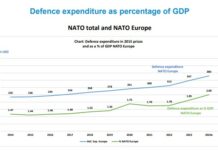Comments recently made by likely Republican nominee for the US presidency Donald Trump on NATO nations’ defence spending have been roundly condemned from many quarters, including the alliance, current US President Joe Biden, the European Union and former US military commanders.
Addressing a rally in Conway, South Carolina, on 10 February 2024, Trump recalled that during his presidency the leader of a “big country” had presented a hypothetical situation in which he was not meeting his financial obligations to NATO, had come under Russian attack and had asked if the US would come to his country’s aid in that scenario.
“I said: ‘You didn’t pay? You’re delinquent?’ Trump recalled, adding that he replied, “No, I would not protect you. In fact, I would encourage [Russia] to do whatever the hell they want. You gotta pay. You gotta pay your bills.”
Trump’s comments are in flagrant disregard for one of the key underlying principles of NATO: the alliance’s Article 5 security guarantee, which states that an attack against one ally would be considered an attack against NATO as a whole.
NATO Secretary Jens Stoltenberg stated on 11 February, “Any suggestion that allies will not defend each other undermines all of our security, including that of the US, and puts American and European soldiers at increased risk.”
President Biden issued a statement on 11 February that read, “Donald Trump’s admission that he intends to give [Russian President Vladimir] Putin a greenlight for more war and violence, to continue his brutal assault against a free Ukraine, and to expand his aggression to the people of Poland and the Baltic states are appalling and dangerous.”
“America’s leadership on the world stage and support for our allies is critical to keeping the American people safe here at home,” Biden added. “If my opponent, Donald Trump, is able to regain power, he is making it clear as day that he will abandon our NATO allies.”
European Council President Charles Michel called Trump’s comments on NATO “reckless” on 11 February, adding that they “serve only Putin’s interest”.
Ben Hodges, who served as the commander of US Army Europe from November 2014 until January 2018, was reported by the UK’s The Times newspaper on 12 February as saying that Trump’s comments were “strategically illiterate” and risked “screwing” the United States’ own security interests.
Hodges further suggested that Trump was “absolutely prepared” to turn his back on Europe if he returned to the White House.
During his presidency, which ran from January 2017 until January 2021, Trump repeatedly accused some NATO nations of not meeting their financial obligations to NATO, claiming it was not in US interests to prop up the alliance financially.
NATO Defence Ministers agreed in 2006 to commit to a minimum of 2% of their countries’ GDP to defence spending to guarantee the alliance’s military readiness.
In 2017, when Trump assumed the US presidency it was estimated by NATO that just four of the then 28 allies were meeting this threshold. In 2020, Trump’s last full year in office, NATO estimated that 11 of 29 allies had reached 2% of GDP defence spending.
This has led some of Trump’s supporters in the Republican Party to claim Trump was playing a shrewd game with his harsh criticism of NATO spending, which ultimately had a positive effect. However, not until 10 February has Trump’s stance been in such stark disregard for NATO’s underlying principles.
NATO’s latest estimates, for 2023 (ie a year after the Russian invasion of Ukraine), again have 11 nations out of 30 meeting the threshold. However, the United States is no longer the top spender in GDP terms, with Poland spending 3.9% of its GDP on defence compared to the United States in second place on 3.49%. NATO’s figures have Greece topping the list in 2022 and 2021 at an estimated 3.54% and 3.59% of GDP respectively, with the United States in second place with 3.46% and 3.57%.
Also playing into Putin’s hands, Trump has also so far martialled the Republican Party in Congress to block a US foreign military aid package that would include around USD 61 billion (EUR 56.6 billion) for Ukraine.






